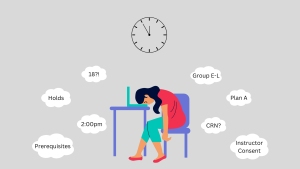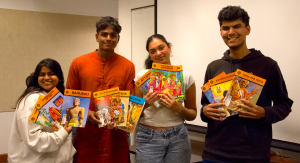The 2024 Global Peace Film Festival (GPFF) ran from Sept. 17-22, with many entries screened locally at Rollins’s Bush Auditorium. The festival’s mission is to cultivate global peace “through communication, media, and the arts.”
Entry was free to all Rollins students who presented their R-Card, offering a great chance to talk with filmmakers, learn about social issues, and feel inspired to make a positive difference in the world.
Every year, a new cohort of students take the Media, Peace, and Justice course offered by the Critical Media & Cultural Studies Department and work on promotional materials for the GPFF. This year’s Media, Peace, and Justice class runs from Aug. 26 to Oct. 9, instead of a full semester, and required students to be available throughout the entire festival.
On the class’s revised format, course instructor, Dr. Nicole Richter, remarked, “It’s a lot of work on the front end and the first few weeks are very intense. It teaches the skills of spontaneity, improvisation, and being able to come up with interactive campaigns in a short period of time, which is what you might encounter in a workplace setting.”
Dr. Richter also spoke of the power and potential that younger generations wield in influencing culture and society. She hopes that students in Media, Peace, and Justice “learn how to build coalitions, find their voice, and share their voice or platform with a wider audience.”
Aside from students enrolled in the class, Dr. Richter recommended that students of all majors take part in the cultural experience of attending a film festival: “It’s an opportunity to meet filmmakers and actors, form connections, network with others, and to learn from artists.”
The Global Peace Film Festival covered a broad range of issues related to peace. Dr. Richter explained that beyond stopping wars, promoting global peace involved addressing issues in topics like “sustainability, women’s rights, racism, and structural inequalities.”
With a diverse selection of screenings to choose from, the GPFF was a great opportunity for Rollins students to learn from film, engage in dialogue, and feel empowered to affect change. As Dr. Richter encouraged, we should consider “how we can take individual actions after our experience with a film and share that with others.”

















Comments are closed.